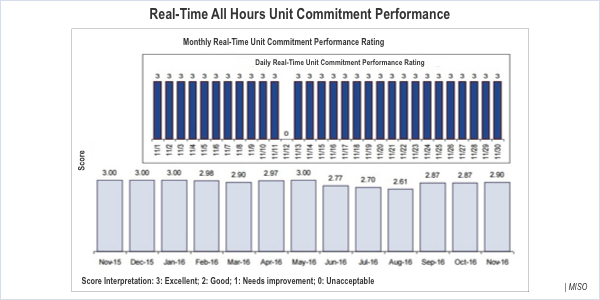MISO told stakeholders last week that its own data set might have been partly to blame for generators not responding efficiently to dispatch instructions.
Steve Swan, MISO senior manager of dispatch and scheduling, said part of the problem was the timing of the RTO’s unit dispatch system, which previously captured generator output measurements prior to the end of a five-minute settlement interval in order to inform the next dispatch. Swan said MISO moved the timing forward about 40 seconds — but still prior to the end of the five-minute period — to ensure that results contain the most up-to-date dispatch information to avoid improperly restricting generator movement.
The RTO hopes the new timing will reduce the likelihood that a generator mistakenly appears to be lagging based on a dispatch estimate that lacks the most up-to-date information. The change took place Dec. 15.
“I don’t know if it’s going to solve all of the problems, but at least now when they see a generator not moving at the offered ramp rate, it’ll not be because of MISO instructions,” Swan said during the Jan. 5 Reliability Subcommittee meeting.
MISO currently marks generators off-control — online but not dispatchable — if they fail to follow set point instructions and do not move on their offered ramp rate.
Swan said MISO will compare data before and after the change to determine whether any lags remain and the RTO needs to pursue the issue further.
Independent Market Monitor staff member Michael Wander said that — even after the change — there will be some degree of lag that will be “practically impossible” to eliminate. Still, he thinks the change will bring an improvement.
The Monitor’s 2012 State of the Market Report suggested that MISO develop better tools to identify units that are derated or not following dispatch so that they may be placed off-control. That suggestion was included among other recommendations for improving thresholds for uninstructed deviations. (See Monitor Again Criticizes MISO’s Uninstructed Deviation Rules.)
MISO Reports Successful November
MISO reported a smooth November in its latest monthly operations roundup, with markets performing as expected.
Above-average temperatures during the month contributed to an average 68 GW of load and a peak load of 81.9 GW on Nov. 21. November gas prices averaged $2.44/MMBtu, down 16.2% from October.
The month was free from any minimum or maximum generation events or warnings, but MISO on Nov. 12 earned the lowest unit commitment performance rating for the month, with committed but unnecessary resources remaining online to meet minimum run-times.
The RTO on Nov. 28 hit a new 13.3-GW wind production record, which was surpassed Dec. 7 when output reached 13.7 GW.
FERC Liaison: No Commission Disruptions
Chris Miller, FERC liaison to MISO, told stakeholders that the commission will continue to operate as a three-person panel in the near term.
“They all work very well together and have gotten a lot of work done,” Miller said of commissioners Norman Bay, Colette Honorable and Cheryl LaFleur.
Honorable’s term ends in June, but she is eligible to serve until the end of the year under a grace period if the Senate is unable to confirm a replacement, Miller noted. He said FERC staff are prepared for the impending leadership change, and as direction changes are the norm at the commission, the agency expects no delays in work output. (See CPP, FERC’s Bay, Honorable Among Losers in Trump Win.)
— Amanda Durish Cook





